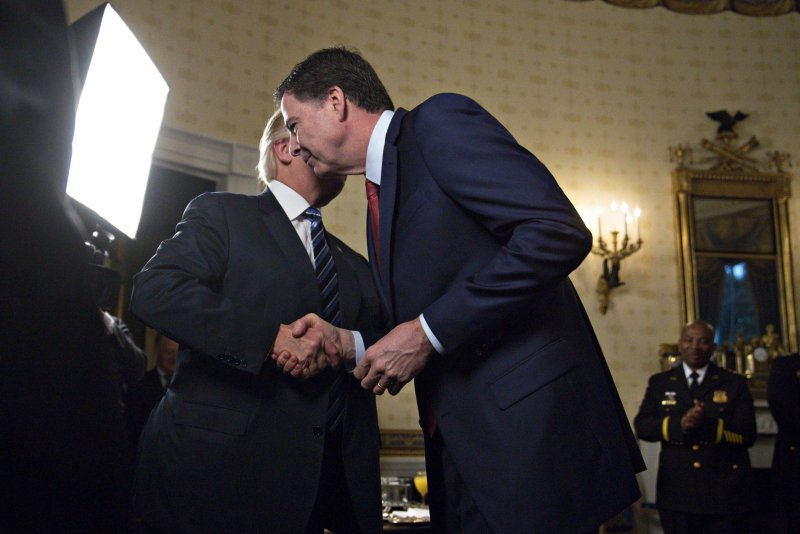President Donald Trump shakes hands with then-FBI Director James Comey during an event at the White House on January 22. Comey is scheduled to testify in the Senate on Thursday about his talks with Trump concerning Russia. File Photo by Andrew Harrer/UPI/Pool |
License Photo
June 7 (UPI) -- Former FBI Director James Comey plans to tell Senate investigators that President Donald Trump asked him to end a Justice Department inquiry as it related to former national security adviser Michael Flynn, according to prepared remarks released Wednesday.
Comey submitted a seven-page opening statement a day ahead of his appearance before the Senate's Select Committee on Intelligence.
In his statement, Comey recalls several one-on-one conversations he had with Trump over four months -- three in person and six over the phone. He met privately with Trump in the Oval Office on February 14, one day after Flynn was fired.
"'I hope you can see your way clear to letting this go, to letting Flynn go,'" Comey quoted Trump as saying in his statement. "'He is a good guy. I hope you can let this go.'"
"I replied only that 'he is a good guy,'" the former bureau chief added. "I did not say I would let this go."
After the meeting, Comey wrote up details of the meeting in a memorandum -- standard procedure for a person in the FBI director's position, experts have noted.
"I immediately prepared an unclassified memo of the conversation about Flynn and discussed the matter with FBI senior leadership. I had understood the president to be requesting that we drop any investigation of Flynn in connection with false statements about his conversations with the Russian ambassador in December," Comey's statement continues. "I did not understand the president to be talking about the broader investigation into Russia or possible links to his campaign.
"It was very concerning, given the FBI's role as an independent investigative agency."
Four other top intelligence officials -- National Security Agency chief Michael Rogers, Director of National Intelligence Dan Coats, Deputy Attorney General Rod Rosenstein and acting FBI director Andrew McCabe -- spoke to the committee on Wednesday. All four were hesitant to share certain details about the case, citing a desire to maintain the investigation's integrity.
Comey agreed to testify before the Senate panel, which is conducting one of three U.S. investigations related to Russia, last week after receiving clearance from special investigator Robert Mueller. The White House said Trump won't attempt to block Comey's appearance.
In his written statement, Comey said during a March phone call the president "described the Russia investigation as 'a cloud' that was impairing his ability to act on behalf of the country."
"I told him I would see what we could do, and that we would do our investigative work well and as quickly as we could," Comey's testimony says.
About two weeks later, Comey said, Trump called and asked what was being done to underscore that he himself was not under investigation.
"'I have been very loyal to you, very loyal; we had that thing you know,''' Comey recalled being told by Trump, adding that he didn't ask the president what "that thing" referred to.
"I discussed with the FBI's leadership team whether I should be prepared to assure President-elect Trump that we were not investigating him personally," Comey's statement says. "That was true; we did not have an open counter-intelligence case on him. We agreed I should do so if circumstances warranted. During our one-on-one meeting at Trump Tower, based on President-elect Trump's reaction to the briefing and without him directly asking the question, I offered that assurance."
The former FBI chief's written testimony confirms one of Trump's key statements -- that he'd been told by Comey at one point that he was not under investigation. Trump mentioned that fact in his letter announcing Comey's dismissal on May 10.
Comey also said Trump told him in January, "I need loyalty. I expect loyalty."
"I didn't move, speak, or change my facial expression in any way during the awkward silence that followed," Comey wrote. "We simply looked at each other in silence. The conversation then moved on, but he returned to the subject near the end of our dinner."
"You will always get honesty from me," he said he told the president.















